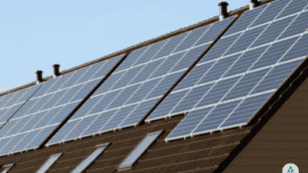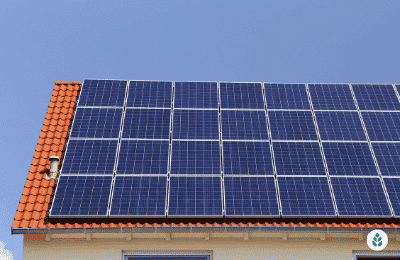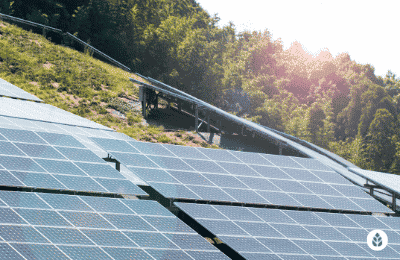
How Much Do Solar Panels Cost in Kansas? (2024 Savings Guide)
In this guide on the cost of solar panels in Kansas, you’ll learn:
- What the average cost of going solar in The Sunflower State is
- How Kansans can save money when going solar
- Which local installation companies have the best prices
Each product and or company featured here has been independently selected by the writer. You can learn more about our review methodology here. If you make a purchase using the links included, we may earn commission.
Installing solar panels in Kansas is almost always financially beneficial, with the average system paying for itself in 12 years and then saving an additional $24,685 on utility bills. However, while the long-term benefits are clear, many homeowners get caught up on the installation costs, which can be prohibitively expensive in some cases.
In this guide, we’ll not only discuss the average cost of solar panels in Kansas, but we’ll also explain how to save money on your solar project and how you can make sure you set yourself up for the maximum return on your solar investment.
What Will Your Solar Panel System Cost in Kansas?
The average cost for solar panels in Kansas is $3.20 per watt. Most residents have monthly energy demands that require a 9 kilowatt (kW) system, which brings the total cost to install solar panels to $28,800 or $20,160 after the federal investment tax credit (ITC) is applied.
Since solar panel systems in Kansas are priced mostly by wattage, the size of your system plays a significant role in your total system price. The watts required depend on several factors, including the size of your home and your typical rate of electricity consumption per month.
The table below includes some common system totals based on average home sizes and energy usage rates in Kansas.
| Solar Power System Size | Energy Use (per month) | House Size (sq ft) | Total Cost | Cost After the Federal ITC | Energy Savings (over 25 years, after system is paid off) |
| 6 kW | 600 kWh | 1,400 | $19,200 | $13,440 | $11,220 |
| 7 kW | 700 kWh | 1,600 | $22,400 | $15,680 | $13,090 |
| 8 kW | 800 kWh | 1,800 | $25,600 | $17,920 | $14,960 |
| 9 kW | 900 kWh | 2,000 | $28,800 | $20,160 | $16,830 |
| 10 kW | 1,000 kWh | 2,200 | $32,000 | $22,400 | $18,700 |
| 11 kW | 1,100 kWh | 2,400 | $35,200 | $24,640 | $20,570 |
| 12 kW | 1,200 kWh | 2,600 | $38,400 | $26,880 | $22,440 |

Blue Raven Solar
Pros
- Industry-leading in-house financing
- Competitive pricing
- Excellent reputation
Cons
- Doesn't offer solar batteries (coming 2022)

Astrawatt Solar

Average cost
Pros
- Comprehensive service offerings
- Excellent reputation
- Award-winning company
- Educational, no-pressure sales approach
Cons
- Limited service area
- Relatively young company

GenPro Energy Solutions

Regional Service
Average cost
Pros
- NABCEP-certified technicians
- Competitive pricing
- Multitude of products and services
Cons
- No leases or PPAs
- Limited warranty coverage
How Do Kansas’ Solar Prices Compare to the National Average?
Kansas residents pay below-average prices per watt for photovoltaic (PV) equipment. The typical cost per watt in Kansas is $3.20, which is slightly lower than the national average of $3.33. On a watt-per-dollar basis, your money goes further in Kansas than it would in most other states.
Additionally, Kansas residents have nearly identical energy demands to the national average — 883 kilowatt-hours (kWh) per month compared to 881 kWh in the rest of the country. That means residents typically require the same size system as most other states: 9 kW.
With slightly lower costs per watt solar panels and identical size requirements for their systems, Kansans pay around $1,170 less than most U.S. residents for solar panel systems. The typical cost to go solar in Kansas is $28,800 before the tax credit and $20,160 after, compared to the national averages of $29,970 and $20,979, respectively.
Not only does your money go a bit further, but total conversion costs are also below average in Kansas, given the local energy needs.
What Are the Main Factors of Solar System Costs in Kansas?
Solar panel systems in Kansas remain below the national average cost for a few reasons, including the following:
- The average energy demands in the state
- The abundance of sunlight in Kansas
- The net metering policy and the demand for solar batteries
We’ll explain how these factors play a role in the average pricing in the Sunflower state in the following sections.
The Average Energy Needs in Kansas
Kansas residents consume around 883 kWh of electricity each month, which is right in line with the U.S. average. Since solar arrays are priced based on the size requirements for the system and the size of the system is largely based on monthly energy consumption, Kansans see prices that are around average.
We recommend upsizing your system a little to account for natural panel degradation and a loss of efficiency over time, but overall, the energy demands in the area don’t push the system size or typical price much above or below what you’d see in most other states.
The Above-Average Sunlight Availability in Kansas
Another thing to consider is that Kansas residents see around 230 sunny days per year, which is well in excess of the national average of 205. A greater availability of sunlight and solar energy means panels should generate more power over the year than they would in other states that see fewer days of full sunlight.
In some low-sun states, high-efficiency, monocrystalline panels like Maxeon are required to offset energy consumption. These types of solar panels are quite expensive, but they typically pay for themselves in areas where efficiency needs to be prioritized.
Kansas residents can often get away with panels that have a lower efficiency rating and are slightly more affordable, given the sunlight availability. That means generally lower system prices, although we do still recommend monocrystalline panels over polycrystalline ones for their durability and increased lifespan.
We do still recommend Maxeon panels for their durability and overall performance, but they typically aren’t necessary if you’re looking to keep the costs associated with installation down.
The Demand for Solar Batteries in Kansas
Add-on products like solar batteries can add a significant amount to solar panel installation costs — usually $10,000 or more per battery installed. Batteries are recommended in areas where net energy metering (NEM) isn’t available or where power outages are common, but they’re only financially viable in the former.
Kansas does mandate its net metering program for all investor-owned utilities (IOUs), but it doesn’t set the rate at which you’re credited. As such, most electric companies offer avoided-cost rates or wholesale rates, which limit your solar savings via the program. Batteries can be good options in Kansas if you aren’t serviced by an IOU or if your provider uses a less-than-ideal credit rate for power sent to the grid.
You can also justify batteries using the convenience factor. Kansas residents see blackouts more often than just about any other state, in large part because of tornadoes and severe thunderstorms. Although batteries won’t save money during power outages, they do let you maintain electricity.
Watch Below: Learn How Kansas City’s Plan for the Nation’s Largest Solar Array Will Affect You
Additional Costs of Going Solar in Kansas
So far, the costs we’ve discussed largely include panels alone, but there are some additional costs you might need to factor in to get an accurate estimate for your solar array. We’ll discuss these added costs below.
- Additional solar equipment:Panels and larger add-on products like batteries make up the bulk of your system total, but there are some other pieces of equipment you’ll need to be installed so that your system can function. These include wiring, conduit to protect that wiring, inverters to connect your panels to your home and protective equipment like squirrel guards. Some installers include these equipment fees in their estimates, but others might not. These typically only total a few hundred dollars.
- Product markup and administration fees: In addition to different fees for labor, installers can markup the equipment they install differently, which can lead to differences of thousands in your final equipment costs. Some companies might also charge administration fees for filing for permits and enrolling you in solar tax incentives.
- Building permits: Building permits are required by all municipalities in Kansas before any solar equipment can be installed or connected. Most building departments in the state charge filing fees for the permits, which usually total between $25 and $250 in Kansas. Your installer or your local building department should be able to provide a total cost for you. It’s worth mentioning that you might also be on the hook for reinspection fees if you’re not present for your initial scheduled inspection.
- Interconnection application and inspection fees: Your utility company will require that you or your installer fill out an interconnection application fee to get your clean energy system connected to the grid. They may also need to send out a representative to inspect the connection to make sure it was made properly. Depending on your electric company, you might see application and inspection fees totaling up to around $150.
What Maintenance Costs Can Solar Owners Expect in Kansas?
Installing solar equipment in Kansas is rather expensive, but thankfully, the installation cost should be the only money you lay out for your system. Your warranty coverage should insulate you from repair or replacement costs if you run into any issues.
The only ongoing service some customers pay for is panel cleaning, which removes dirt, pollen, leaves and other debris from your panels to maximize the efficiency. In most parts of Kansas, there is sufficient rainfall to keep your panels naturally clean, so you shouldn’t feel the need to pay $100 to $150 for annual cleaning services.
Which Solar Financing Options Will Help You Save the Most in Kansas?
There are four primary ways to pay for your solar panels: cash, a solar loan, a solar lease or a power purchase agreement (PPA). The options available to you will depend on the solar panel installation company you choose to handle your solar project. Most accept cash and loans, but leases and PPAs are less common.
Overall, we strongly recommend a cash purchase if you can afford it. Paying in cash will stick you with the entire bill upfront, which means it’s the least accessible option. However, you’ll own your panels immediately.
That means you can take the federal solar tax credit — an average potential value of just under $7,000 in Kansas — and you’ll avoid paying interest, as you would with a loan. Paying in cash means you’ll see the fastest panel payback period, so you’ll have the longest time to accumulate energy savings.
Using a solar equipment loan is a more accessible option since there is usually no down payment required, and you can spread out the cost of your system over several years. However, the interest you’ll pay will reduce your total savings by around $5,000 and will extend your panel payback period.
A lease — basically a rental agreement through which you save money by using the produced energy to offset your electric bills or reduce your electricity rates — won’t let you take the federal credit and never leads to panel ownership. These save significantly less than both cash and loans.
A power purchase agreement also never leads to panel ownership. Instead, you let the installer put panels on your roof, and you agree to pay a slightly reduced rate for electricity directly to your installer. We don’t recommend this option unless none of the others are accessible to you.
We recommend using our solar calculator to get an idea of what your system will cost and then using the table below to determine which options you can afford now and over time. Choosing the one with the highest savings in the long run that fits into your budget is your best bet.
If you want to keep your options open, you can get solar quotes from SunPower and Shinnova Solar. SunPower accepts all four payment options, and Shinnova accepts cash, loans and leases.
| Financing Method | Total 25 Year Savings (estimated) | Initial Costs (estimated, after the federal tax credit) | Monthly Payments (estimated) | Payback Period (estimated) |
| Cash | $24,685 | $20,160 | $0 | 12 years |
| Loan | $20,000 | $0 | $100 – $225 | 16 years |
| Lease | $5,000 | $0 | $110 | N/A |
| PPA | $4,000 | $0 | $110 | N/A |
What Are Other Ways You Can Save When Going Solar in Kansas?
Choosing the right financing option can save you thousands, but there are some other things you can do to help minimize the cost of your initial solar installation and maximize your long-term savings. These include the following:
- Take advantage of solar incentives
- Consider solar batteries carefully
- Choose mid-tier efficiency panels
We’ll explain how these strategies can help you save in the following sections, and we’ll also include some estimated dollar amounts each can save you.
Take Advantage of Kansas’ Solar Incentives
One of the best things you can do to save money on your solar project is to make sure you take as many incentives and solar rebates as you can in Kansas.
The federal tax credit is available to all residents and provides some of the largest effective savings possible in the state. The credit holds an average potential value of around $8,640, so you can effectively reduce the cost of your solar project by that amount just by applying for the perk.
Kansas residents also have access to a property tax exemption for solar equipment and net metering, which can boost your savings by thousands of dollars over time.
Consider Solar Batteries Carefully
Kansas currently mandates net metering for all IOUs, which means most solar customers will be able to overproduce energy when the sun is shining, bank it and call on it for free when their panels underproduce. NEM helps maximize the value of all of your produced energy.
Since solar batteries offer this same perk, they generally aren’t considered a good financial decision in Kansas. Installing a single battery will add around $10,000 or more to your conversion costs, and you’re unlikely to see a return on that investment.
However, if you aren’t serviced by an IOU and don’t have access to net metering, then installing a battery could very well pay for itself over time.
Choose a Panel Brand With a Moderate Efficiency Rating
Finally, you can opt for a less expensive panel brand than the top performers. High-efficiency panel brands like Maxeon are great because they allow you to maximize your energy production and give you the best chance of offsetting your energy bills. However, they’re usually more expensive than middle-of-the-road panels.
For example, you’ll pay around $4.00 per watt for Maxeon panels with an efficiency rating of 22.8% but only $3.75 per watt for QCells panels that have an efficiency rating of 21.4%. The lower efficiency will mean less production in all situations, but they’re more affordable.
In a place like Kansas that sees significantly more sunlight per year than most states, homeowners can get away with lower-efficiency panels and still have a good shot at eliminating their energy bills. This is especially true for customers of IOUs in the state that have access to net metering.
What Are the Typical Costs of Kansas’ Solar Installers?
Another factor that can affect your total solar conversion cost in Kansas is the installer you choose to handle your solar project. Every installer that operates in the state charges different amounts for their labor, and two companies offering similar equipment could end up being thousands of dollars apart in their pricing.
The table below includes a quick side-by-side look at how some of the best solar companies in Kansas compare in terms of pricing and overall rating. This should help you figure out which providers are likely to fit into your budget.
| Solar Company | Superlative | EcoWatch Rating (Out of 5.0) | BBB Rating | Average Price ($–$$$$$) |
| SunPower | Best National Provider | 5 | A+ | $$$$ |
| ADT Solar | Best Warranty Coverage | 4 | A+ | $$$ |
| Blue Raven Solar | Best Financing Program | 4.5 | A+ | $$ |
| Astrawatt Solar | Best Regional Provider | 4.5 | A+ | $$$$ |
| Shinnova Solar | Best Customer Service | 4.5 | A+ | $$$ |
How Are Solar Costs and Regulations Trending In Kansas?
Based on data from the Solar Energy Industries Association (SEIA), the cost of solar energy equipment in Kansas has dropped by 54% in the past ten years. We believe this is largely due to an increase in solar demand, which has led to innovations in manufacturing and production. In turn, those improvements in production have helped prices fall.
Since the demand for solar equipment is still growing and shows no signs of slowing down, we would be surprised if equipment prices didn’t continue to fall in the coming years. It’s unlikely that the dip will be as drastic as it has been in the recent past, but prices should continue to fall.
As far as incentives and solar rebates go, there are no plans currently in place to decrease the availability or the benefits of the incentive programs currently in place. However, Kansas’ renewable portfolio standard (RPS) goal to reach 20% renewable energy in the state ended in 2020. Since RPS goals are usually the impetus for new or improving incentives, we don’t expect any new perks to become available anytime soon.
Additionally, it’s possible that currently available incentives will become less enticing now that the goal has been met. If something does change, we’d expect it to be the net metering policy, which is often the first solar perk to get downgraded in the U.S.
With prices lower than they’ve ever been and incentives subject to decrease in the coming years, there has never been a better time to go solar in Kansas than right now. You can get started now by using the tool below to get solar quotes from reliable installers in your area.
Read More About Going Solar
- What Are the Best Solar Installers in Kansas?
- Is it Worth Going Solar in Kansas?
- How Much Can You Save With Solar Incentives in Kansas?
The cost information presented in this article is derived from a comprehensive analysis, incorporating data from multiple industry sources. The average cost per watt per state was calculated based on figures from Consumer Affairs, Energy Sage, and Berkeley Lab’s Electricity Markets & Policy Department. Additionally, monthly energy consumption and the average monthly cost of electricity were sourced from the U.S. Energy Information Administration, ensuring a well-rounded and accurate representation of the information presented.
FAQs: Kansas Solar Panel Costs
In the following sections, we’ll answer some of the questions we get asked most frequently about the benefits and cost of residential solar panels in Kansas.
In most cases, yes! Not only is solar equipment less expensive in Kansas than it is in most other states, but Kansans also see above-average amounts of sunlight that improve the value of solar energy systems and boost your savings. The typical renewable energy system in KS pays for itself in around 11 years and then saves an additional $24,685 after that point, on average.
The typical price for a complete solar array in Kansas is $28,800 before the federal tax credit or $20,160 after the credit is applied. These numbers assume that you pay the typical cost of solar equipment in the state of $3.20 per watt and need a 9 kW system, which is what most Kansans need to offset their energy bills.
Kansas does not have a state solar tax credit, but all homeowners in the state do have access to the federal solar tax credit. This is a credit to your income taxes owed in the amount of 30% of your system cost. In Kansas, the federal credit holds an average potential value of $8,640.
Yes, your solar panels are expected to increase your property value by an average of 4.1% in Kansas. Buyers typically see a reduced carbon footprint, minimal energy costs and a reduce reliance on fossil fuels as a selling point and are willing to pay more. You get the biggest return on investment in terms of boosted home value in areas where property values are higher, like Kansas City.
Related articles
Top Solar Installers in Kansas Cities
Comparing authorized solar partners
-
- Industry-leading in-house financing
- Competitive pricing
- Excellent reputation
- Doesn't offer solar batteries (coming 2022)
A+Best Solar Financing2014Trina Solar, Canadian Solar, SolarEdge, Silfab, SunPower25-year manufacturer warranty; 10-year workmanship warranty, 2-year production guarantee
Having trouble deciding? Click below and use our process to receive multiple quotes instead:

 233k
233k  41k
41k  Subscribe
Subscribe 








